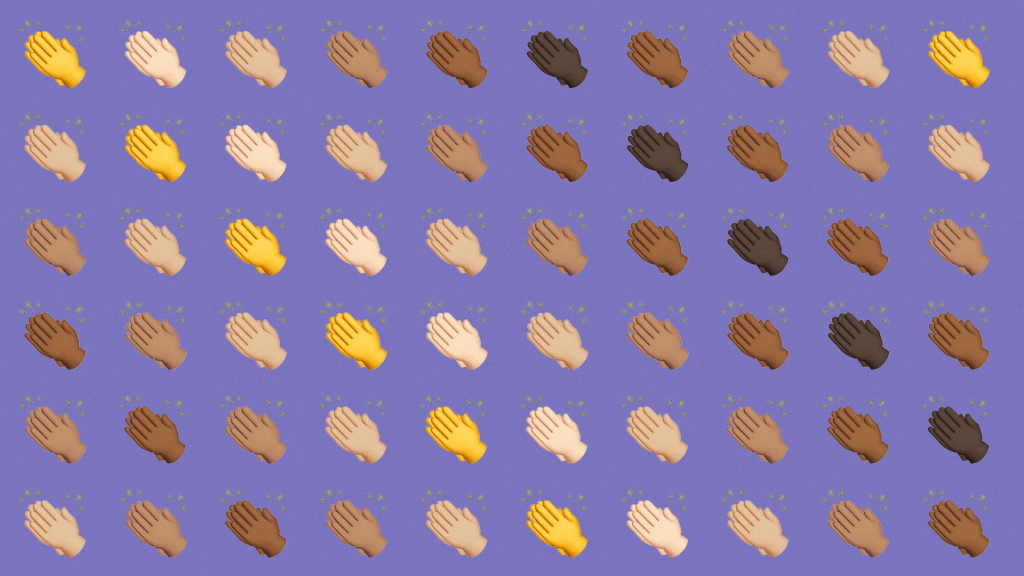Clapping hand emojis have entered the Pumpkin Spice Latte Danger Zone: basic, banal and stripped of their Blackness. Everyone from culture vultures (see: Khloé Kardashian) to keyboard cowboys (everyone with a data plan) has colonized the expression, ignoring its Black roots, rather than deferring to Black people about its usage.
There’s no question that clapping hands, especially placed between words, are an invention of Black women’s genius. They’re borne of visceral and multi-layered body language; we do it to express love, to tell you “what you not about to do today”, to “read” someone. And like the term “on fleek”, they have seeped into popular American culture, while simultaneously side-lining their creators. (For the record, these trends don’t belong to the wider public but Robin Thede, Kara Brown, and The Black Women of America.)
Videos by VICE
But the lawlessness of social media accelerates the toxic cycle of mining and consuming culture, making it even easier to imitate Black culture and simultaneously erase the Black people who created it. The unexamined adoption of popular Black things is at odds with the persistent prejudice against Black people, and in this case, Black women in particular. And if we don’t recognize this disease, and treat it at the source, we will continue to be made invisible.
According to iemoji.com, the clapping emojis have been around for a minute, dating back to iOS 2.2 (think iPhone3, circa 2008). One could say they hit the mainstream by 2015, when Complex featured it in the article, “Emojis that Have a Second Meaning on #RapTwitter”. (I’ve never heard of such a thing as #RapTwitter, but I digress.)
The handclap was described as: “Extra emphasis when making a point, declaration and/or statement.” But Black people, especially Black women, have been doing this for a long time. Black culture puts a premium on saying things with originality and flair (“being extra”), and the use of clapping hands is an extension of that. It’s our own version of sprezzatura.
Of course, clapping emojis are not singular in the manner they’ve been taken from Black culture and exploited. “Woke” is so lame now, I’d rather be asleep. “Lit” has completely jumped the shark. (There’s a replacement word percolating in the digital underground, but I’m not telling.) I’m tired. The obsession with consuming Black culture, and the rampant anti-Blackness that cuts across all of the racialized Americas is exhausting. See: Paul Mooney.
Now when Black people use clapping hand emojis (or twerk, or wear braids, wear Timberlands, etc) it’s considered ghetto, but somehow “cool” when other people adopt it. Erasure has occurred. It’s like someone who invites themselves to your bomb ass house party, and then starts making song requests and asking for gluten free crackers. Who the fuck asked you?
The argument is (loudly and wrongly) that the clapping emojis used between words doesn’t belong to anyone except popular culture, except for that teensy, inconvenient fact that Black people are popular culture. (Don’t @ me. Read Vann C. Woodard and James Baldwin’s “If Black English Isn’t a Language, Then Tell Me, What Is?” instead.) But the clapping is just the most recent example of Black wit, that has been circulated in non-Black circles and applied almost to exhaustion. Slate even published a piece that no one needed last year about the annoyance of the emoji.
How did the culture (not to be confused with The Culture) get to this point? It’s really simple: everyone, including Black people, is erroneously taught that Black genius is more or less, public property with no clear “ownership.” They’re taught that it’s morally acceptable for pretty much everyone to consume Black culture, with little regard or examination of one’s own anti-Blackness. (We are all, even Black people, taught to be anti-Black from the moment that we are aware of race. Don’t @ me. Read The History of White People.)
This message comes in the form of erasing Black people from rock music. It’s how Black people make up a disproportionate number of NBA and NFL players, but are almost invisible in the ranks of its leadership and franchise owners. It’s when non-Black people think that they’re qualified to decide whether a trend that wasn’t meant for them to begin with is “over” or not.
The principles aren’t new—this is, after all, a country that became a superpower using centuries of free and cheap Black labor—there’s just a new mechanism for the Whitewashing. Wash, rinse, repeat.




